Ma Kuai-dao often fantasizes about his neighbor, the scholar Xu Shen-yu. Ma imagines that he could do his best work on Xu’s sinewy frame, well-proportioned torso and muscular legs. A series of historic events enables Ma to get closer to the object of his musings.
Ma’s reveries are a central plot device that keeps the action moving along at a rapid pace in The Scholar and the Executioner (秀才與劊子手), a contemporary Chinese play produced by the Shanghai Dramatic Arts Center (上海話劇藝術中心), which makes its Taiwan debut beginning next Thursday at Taipei City’s National Theater. The play, which is part of Taipei Arts International Association’s (TAIA) 2008 World Drama Series, runs until June 8.
Billed as a black comedy, the period piece takes place during the twilight of the Qing Dynasty — a time of considerable social upheaval.
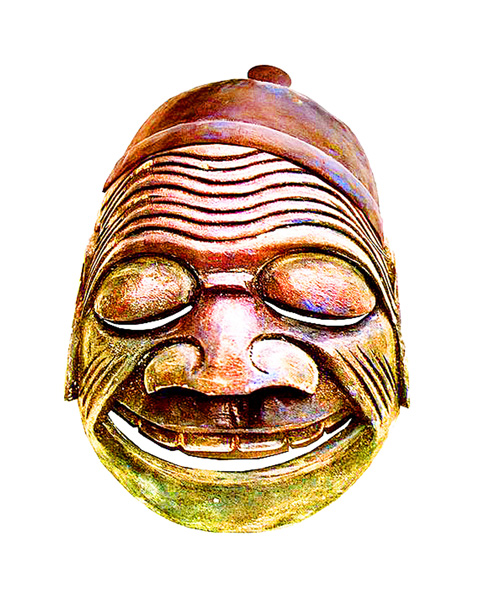
PHOTO COURTESY OF TAIPEI ARTS INTERNATIONAL ASSOCIATION
The award-winning script, written by Chinese theater practitioner and theorist Huang Wei-ruo (黃維若), humorously follows the lives of two men who are affected by the government’s attempt to modernize China’s backward society and, in the process, maintain power.
The first is the executioner and torturer “Fast Knife Ma” (Ma Kuai-dao, 馬快刀). Hailed throughout the region as a professional torturer who inflicts the maximum amount of pain on his victims by shearing off their flesh with a variety of knives — a process known as lingchi (“death by a thousand cuts,” 凌遲) — Ma revels in the adulation that crowds of bystanders bestow on him while engaged in this work.
Xu Shen-yu (徐聖喻) is an unaccomplished scholar who has passed the county examination, a minor test that confers a modicum of reputation on the candidate. But Xu has dreams of becoming a famous official in the imperial bureaucracy and spends all his money preparing for and sitting the provincial examinations, which he always fails. Penniless, he takes a job at a private school to prepare students for the examination he himself has passed.
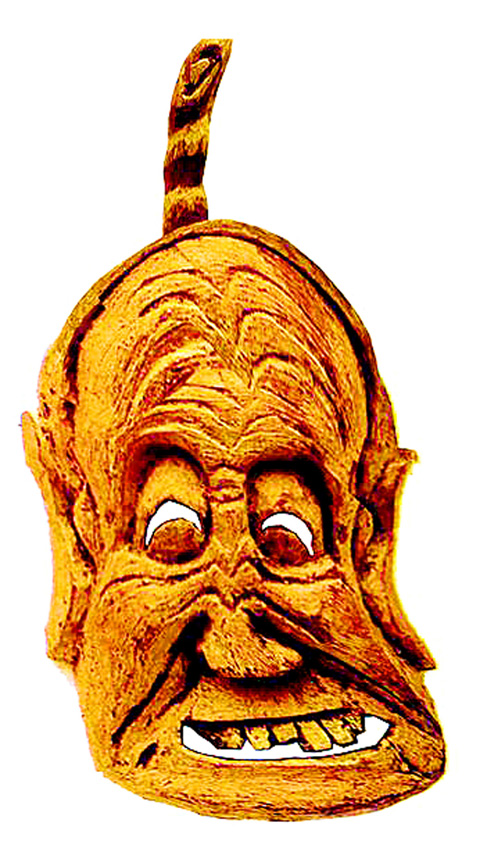
PHOTO COURTESY OF TAIPEI ARTS INTERNATIONAL ASSOCIATION
One day, Fast Knife Ma’s fantasies of slicing up his neighbor are interrupted by an imperial edict abolishing the national examination system and death sentence. Fast Knife immediately goes into a depression that is only alleviated when his wife, Zhi Zi-hua (梔子花), convinces him to begin a new, and to Ma, less honorable profession: that of a butcher.
At first, Ma finds his job boring — the squeals of the animals are no substitute for the screams of his former victims — but soon gains a certain degree of satisfaction through the process of removing flesh from bone. As Ma’s skills as a butcher improve, he draws the same crowds he did in his former incarnation as torturer and executioner.
With Ma’s newfound success he convinces Xu to quit his job as private tutor and become a butcher as well — an interesting social reversal because the butcher now becomes teacher to the scholar. Tension is also created because the audience is unsure whether Ma will skin his neighbor.
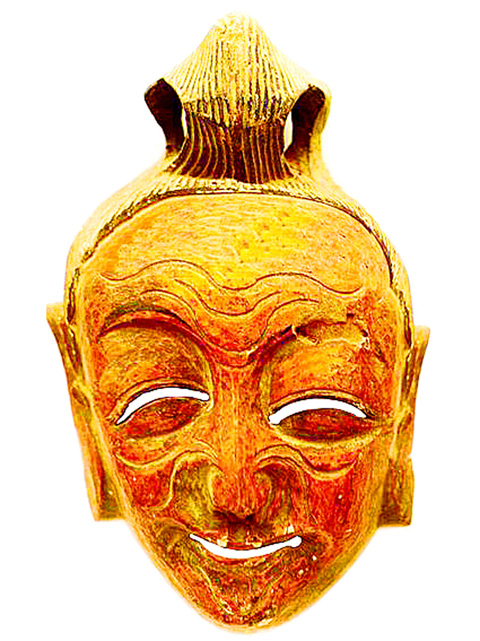
PHOTO COURTESY OF TAIPEI ARTS INTERNATIONAL ASSOCIATION
The play’s comic flavor is enhanced by Huang Hai-wei’s (黃海威) hand-carved wooden masks, which are inspired by the nuo (儺) masks of Sichuan Opera and Italian commmedia. With the exception of the scholar, executioner and his wife, all characters on the stage wear masks — another interesting reversal because in traditional Chinese theater only the lead characters on stage would wear masks.
But does the butcher end up living out his fantasies? You’ll have to watch the show to find out.
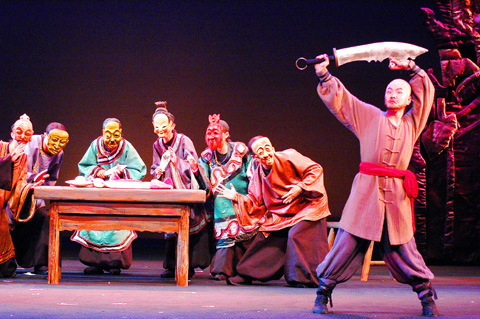
PHOTO COURTESY OF TAIPEI ARTS INTERNATIONAL ASSOCIATION
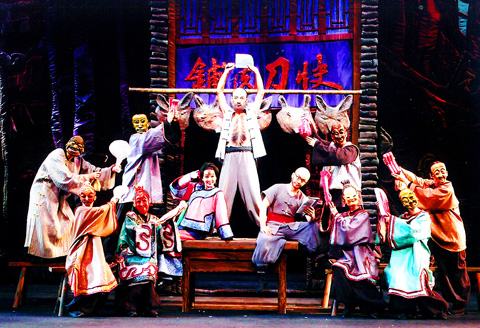
PHOTO COURTESY OF TAIPEI ARTS INTERNATIONAL ASSOCIATION
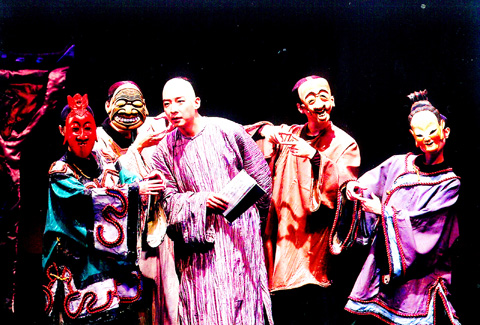
PHOTO COURTESY OF TAIPEI ARTS INTERNATIONAL ASSOCIATION

Behind a car repair business on a nondescript Thai street are the cherished pets of a rising TikTok animal influencer: two lions and a 200-kilogram lion-tiger hybrid called “Big George.” Lion ownership is legal in Thailand, and Tharnuwarht Plengkemratch is an enthusiastic advocate, posting updates on his feline companions to nearly three million followers. “They’re playful and affectionate, just like dogs or cats,” he said from inside their cage complex at his home in the northern city of Chiang Mai. Thailand’s captive lion population has exploded in recent years, with nearly 500 registered in zoos, breeding farms, petting cafes and homes. Experts warn the

No one saw it coming. Everyone — including the Chinese Nationalist Party (KMT) — expected at least some of the recall campaigns against 24 of its lawmakers and Hsinchu Mayor Ann Kao (高虹安) to succeed. Underground gamblers reportedly expected between five and eight lawmakers to lose their jobs. All of this analysis made sense, but contained a fatal flaw. The record of the recall campaigns, the collapse of the KMT-led recalls, and polling data all pointed to enthusiastic high turnout in support of the recall campaigns, and that those against the recalls were unenthusiastic and far less likely to vote. That

The unexpected collapse of the recall campaigns is being viewed through many lenses, most of them skewed and self-absorbed. The international media unsurprisingly focuses on what they perceive as the message that Taiwanese voters were sending in the failure of the mass recall, especially to China, the US and to friendly Western nations. This made some sense prior to early last month. One of the main arguments used by recall campaigners for recalling Chinese Nationalist Party (KMT) lawmakers was that they were too pro-China, and by extension not to be trusted with defending the nation. Also by extension, that argument could be

Aug. 4 to Aug. 10 When Coca-Cola finally pushed its way into Taiwan’s market in 1968, it allegedly vowed to wipe out its major domestic rival Hey Song within five years. But Hey Song, which began as a manual operation in a family cow shed in 1925, had proven its resilience, surviving numerous setbacks — including the loss of autonomy and nearly all its assets due to the Japanese colonial government’s wartime economic policy. By the 1960s, Hey Song had risen to the top of Taiwan’s beverage industry. This success was driven not only by president Chang Wen-chi’s